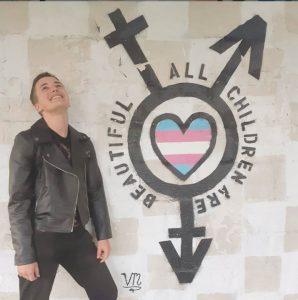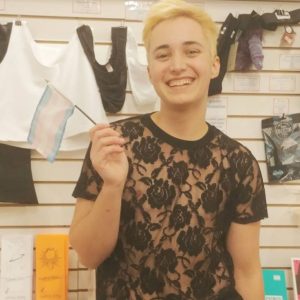Written by Maud Mostly
Illustration by Katie Doyle
It was November 2019, my first year at George Brown College, and I was in my first semester of the Community Worker program listening to a sociology lecture when the word “transgendered” came up on the slide in front of all of us. I was appalled, but I couldn’t claim to be shocked. I am trans nonbinary, and in my two years at George Brown, I have witnessed transphobic incident after transphobic incident in a program supposedly dedicated to anti-oppressive practice. At that moment, I was fortunate enough to be able to speak up and correct the language for my class, but I still think of trans students in the other classes who saw the same slides and may have stayed quiet in fear of outing themselves or retaliation. The professor corrected the slide immediately and explained that another faculty member had made the slides – a faculty member I previously lost faith in earlier that year for being transphobic. Unfortunately, they are one of the heads of my program.
Intentional or unlearned transphobia is rooted in George Brown College all the way up to those in power. And trans students across the college – including myself – are wondering how can we expect to feel safe, learn, and continue attending their courses.

The vast majority of trans students at Canadian schools report hearing transphobic language.
The word “transgendered” is not inherently a slur but it is problematic. It others trans people, communicates that there are people and then there are “transgenders” rather than people who are trans. Over the years, it has moved away from a simple mistake to offensive language, as it is commonly used by transphobic media outlets. So when a word which is often paired with phrases like “corrupting our youth” and “harassing people in bathrooms” showed up in a George Brown sociology class, it was hard to not take the blow.
The head of my program, the one who made the slides on which it was used, taught one of my courses that semester. I never went back to her course. I couldn’t face her anymore, as the presentation that used the word transgendered followed a personal meeting I had with her on the need for more trans inclusion in the Community Worker program, and without validating my concerns she immediately became defensive and told me that they just couldn’t include everything.
This was a single display of how academia leaves trans people out. We are surrounded by textbooks that tell us the differences between men and women, books, and professors that rely on saying “her or she” instead of “they,” and classmates and faculty that inadvertently and purposefully exclude and harm us.
That is to say, the instances I bring up do not exist in a bubble. The decision to move into post-secondary as a trans student is not often a decision made lightly. I made that decision based on the naïve belief that an anti-oppressive program would save me from the tribulations. I claim naivety as I am one of the many trans students who barely made it through high school due to constant harassment and assault, so post-secondary was not on my radar until I found the community worker program. In a 2011 survey by Egale, a national LGBT advocacy organization, they found that 90 per cent of trans students in Canada hear transphobic comments from other students on a daily and/or weekly basis and 23 per cent hear transphobic comments from teachers. The same survey found 25 per cent of the students had been physically harassed and 78 per cent of trans students reported feeling unsafe at school.

Maud has dealt with constant transphobia during their time at George Brown College.
These statistics are emblematic of the reason I did not return to the course that the head of my program taught or ever, even through struggle, seek assistance. I knew it meant facing her again. Why would we force ourselves to exist in places we do not feel safe? Why should we have to take the energy and put a toll on our mental wellbeing to seek education? Even once we are in the spaces, trans students are frequently asked to educate the rest of the class, just like I did in my sociology course. But that is not our job. We are students, not teachers, and we are students who face constant discrimination by being told and shown that we do not belong in institutions to which we have a right. With high rates of poverty, street involvement, and unemployment, trans people are not getting equal access to education and a path towards a better life.
Moving into online education as the pandemic continues has invited new problems. The toll becomes greater for some trans students as schools, including George Brown College, make it difficult or impossible to change your name online if you haven’t changed your legal name. Changing your legal name is a lengthy and expensive process, so it should not be a prerequisite to feeling safer in classes. When we don’t allow people to easily change their names, trans students are inevitably referred to by their dead name – the name they don’t use anymore – on a daily basis by others in the class who can only see the name on their screen.
George Brown’s online learning system also prevents displaying your pronouns, meaning misgendering has been more frequent online as people rely on names and voices to determine what pronouns to use. If someone can’t change their name and their voice doesn’t traditionally “match” their gender they face these exclusionary assumptions regularly. I’ve seen some try to combat this by adding pronouns to all their texts and discussion boards, but that level of openness is not available to those who feel unsafe to do so, and mistakes, once you’ve put in that effort, can deter others.
I write this piece in honour of October 22, which is International Day of Action for Trans Depathologization. Pathologization is the treatment of something as if it were a medical condition, something trans people have faced throughout history. Being trans is not an illness, and if we continue to allow transphobia at all levels of our educational institutions, how do we ever expect anyone in the institutions to know or believe that? On International Day of Action for Trans Depathologization, I want every trans student to know how incredibly resilient they are, and I want all cisgender students and faculty to understand that the burden of responsibility is not on trans students to be resilient but rather on them to build an environment that adequately supports us so that we do not have to be so strong.
Maud Mostly is a trans nonbinary student in the community worker program at George Brown College. They have been reporting for The Dialog since September 2020.

